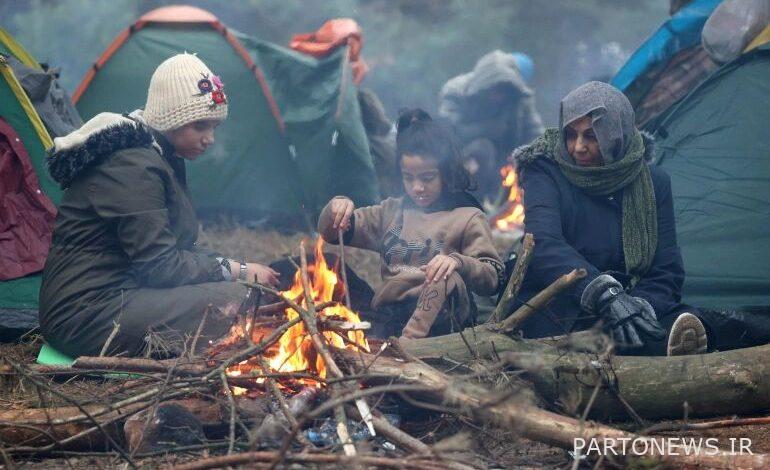Human tragedy on the border between Belarus and Poland

According to IRNA on Saturday, Al Jazeera reported that the number of asylum seekers who have joined the wandering population near the Belarusian-Polish border in hopes of entering the European Union has increased since Monday.
Estimates show that thousands of asylum seekers have now gathered on the border between the two countries. People who want to leave Belarus are not allowed to enter Poland because they are blocked by barbed wire and a large number of security forces sent by Warsaw.
These people live in freezing temperatures without access to basic necessities and health care, and concerns about their health are growing.
Nearly 3,000 to 4,000 asylum seekers, many of them from the Middle East and Afghanistan, are stranded on the Belarusian-Polish border, while human rights organizations and international organizations are concerned about their health.
Relief groups, journalists and lawyers are not allowed access to this critical border area.
Where did the crisis start?
The border crisis between Poland and Belarus began earlier this year, following a reaction by Belarusian President Alexander Lukashenko to EU sanctions. The reason for the sanctions was the forced diversion of a passenger jet in May, following the arrest of an anti-Belarusian journalist who was on board.
Months ago, the European Union and the United States imposed sanctions on Lukashenko’s government on the pretext of cracking down on dissent after the controversial August 2020 election, which sparked widespread anti-government protests.
The move angered Lukashenko, who reacted by saying that Belarus was abandoning efforts to prevent illegal immigrants and refugees from entering the EU, arguing that EU sanctions had deprived the government of the necessary funds to do so. Has been deprived of work.
Since then, EU member states on the border with Belarus, including Lithuania, Latvia and Poland, have said the number of people trying to cross the border has risen sharply.
Who is to blame?
Warsaw blames Russian President Vladimir Putin for escalating the crisis; A claim that Moscow has vehemently denied.
Moscow has accused Poland and some EU countries of trying to “suffocate” Belarus. Moscow on Friday sent paratroopers to Belarus for military exercises.
Tensions are expected to rise. The European Union is considering imposing more sanctions on Minsk in response to the border crisis. These actions target airlines that may be involved.
Belarus continues to demand the lifting of initial Western sanctions against Lukashenko’s government, warning that it will not take any further action.
Minsk has threatened to cut off Russian gas supplies to Europe via a pipeline through Belarus in retaliation for EU sanctions. But on Friday, the Kremlin distanced itself from the threat and said it would live up to its commitments. The European gas market, where prices have peaked in recent weeks, is very sensitive to the issue of gas distribution.
What have other countries done?
Turkey banned Syrian, Yemeni and Iraqi citizens from flying to the Belarusian capital Minsk on Friday, potentially blocking one of the main routes the European Union says Belarus uses to transport migrants and escalate the border crisis.
Britain has sent a team of 10 troops to Poland to help strengthen Warsaw’s borders, where troops are expected to be stationed for several days, and border visits at the request of the Polish government to work together to repair and strengthen barbed wire. will have.
The British Ministry of Defense claims that these missions are for technical support only and that there is no other plan for British troops for border surveillance purposes.
British aid to Poland worries human rights groups, who say Britain should work to help resolve the humanitarian crisis and send troops to strengthen barbed wire instead of resolving the issues of those who die at the border. It is a shocking attention to human life and the right to asylum.
.

